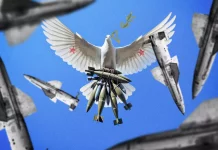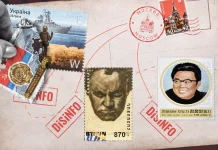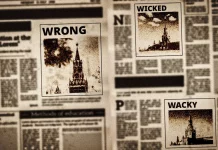
Conspiracies abound in the Dom Knigi store’s non-fiction section, but what is truly unknown is the extent to which Russians believe what is written.
Adolf Hitler was installed in power in Germany as part of an Anglo-American plot, the CIA is planning a full-scale land invasion of Russia from Ukrainian territory within the next five years, and the world has become so dominated by women that they have evolved to be capable of reproducing without the need for male sperm.
All of these ‘facts’ could be gleaned by a curious reader browsing the non-fiction section at Dom Knigi (House of Books), one of Moscow’s biggest bookshops. The shelves are stacked with books offering the most outlandish of conspiracy theories, and, at a time when Russia and the west are in their worst standoff since the cold war, geopolitical conspiracies are more popular than ever.
By far the biggest number of books in the contemporary politics section are devoted to recent events in Ukraine. Tragedy of Ukraine: Concentration Camp Instead of Paradise is a collection of essays on modern Ukraine by different authors. One describes Russia as the main opponent of a new “dehumanisation of mankind” promoted by Washington, and says Ukraine had been infected with “spiritual Aids”.
Events in the country do not just represent “spiritual degradation and nationwide madness”, according to the thesis of Ukrainian Chimera: the Final Stage of the Anti-Russian Project, a glossy-covered hardback. In fact, they are the logical conclusion of a western project that has lasted 150 years and is aimed at turning Ukraine into the launching pad for an attack on Russia by the west.
This longstanding anti-Russian conspiracy is also a common theme of books by Nikolai Starikov, a previously obscure writer who has shot to prominence, becoming one of the founders of the Anti-Maidan movement, which aims to counter any attempts at street protests in Russia. Dozens of his books are now on shelves across the country.
One of his many works, Chaos and Revolutions: the Dollar’s Weapon, explains how all world conflict is instigated by the US in order to prop up its currency. This is a recurring theme in Russian political discourse, but Starikov goes further.
“Washington and London need fools to fight for them, because they don’t like to fight themselves. This is why they brought Adolf Hitler to power in Germany in 1933. You need the person who will start the war, who will not flinch from committing crimes and shedding blood … It’s the same today. They need a madman who will start a new world war in order to save the dollar.”
If the reader, wide-eyed at the scope and history of international conspiracy against Russia, turns to international authors for confirmation, they may be in for another surprise.
Attention was drawn to the Russian publishing industry this week when it emerged that one publisher, Algoritm, had released a series of books about Vladimir Putin without the knowledge of the purported authors. The books included a title called Nobody but Putin, allegedly penned by the Guardian’s former Moscow correspondent Luke Harding, and President Putin’s Mistake, by Moscow-based journalist Michael Bohm. Both said they had not signed any contract with the publishing house, and the books appeared to be a mishmash of columns, extracts and hostile commentary written by third parties.
Some people play down the influence of these books. “There’s always been that sub-genre of books; every country likes conspiracies,” said Boris Kupriyanov, who runs another Moscow bookshop. “Russians read more conspiracies than Brits, but I’m not sure it’s any more than Americans.”
Others say they do have an impact. “Even though each book has a reasonably small print run, when you take them all together, it’s a significant factor, and it’s also combined with all the conspiracy theories on television,” said Alexei Makarkin, a political analyst. “There’s a tendency to think of conspiracy theories as the preserve of less-educated people, but that’s not true in Russia. There are people at all levels who believe in them, including in the elites.”
Recent interviews by top Russian officials support this view. This week Vladimir Yakunin, the head of Russian Railways and a member of Putin’s inner circle, published an article claiming that the third world war could soon be upon us, with the “global financial oligarchy” against the people. Yakunin blamed the US for attempting global political hegemony through the triumph of consumerism, and said the new world war would be a “molecular war”.
Sergei Naryshkin, speaker of the lower house of the Russian parliament, recently wrote a column accusing the US of all manner of provocations, and Nikolai Patrushev, the chief of Russia’s security council and former head of the security services, noted recently that there was proof that the US wanted to destroy Russia. He quoted the former US secretary of state Madeleine Albright as saying that Siberia and the Russian far east did not really belong to Moscow. The only problem was that Albright never said the words: the claim came from a 1990s psychic with links to people in the Kremlin, who would fall into a trance and claim to be able to communicate with Albright.

On the shelves at Dom Knigi, many books blend geopolitical conspiracy with even more outlandish beliefs. Territory of Confusion: Forbidden Facts, part of a popular series by the TV presenter Igor Prokopenko, is a bestseller ranging over many subjects. It has been through several editions since coming out last year and is released by Russia’s biggest publisher.
The blurb on the back cover promises to answer the question: “What are humans really? Bio-robots, descendants from monkeys, or a great alien race?” There are chapters on US attempts to split up the world, Stalin’s undeserved bad reputation, and the worrying trend towards a female-dominated world.
“Recent scientific studies have shown that females will soon be able to take the male role in reproduction, with no external interference. The first cases of self-fertilisation have already been registered. Biologists say that without men, women will not die out immediately, but will instead slowly change their form, in a reverse process of evolution. Do we really now live in a new world, where there are no men and women rule?”
The interest in such views can be seen as a logical conclusion of the tremendous upheaval in Russia over the past decades.
“All of these beliefs are fairly normal for a transitional society that has undergone a political, economic and moral crisis,” said Makarkin. “If you spent your youth being told Marxism-Leninism was the only true philosophy and then you found it was nonsense, it’s not surprising you start to wonder if everything else you thought about the world might not be a trick too.”
By Shaun Walker, The Guardian





